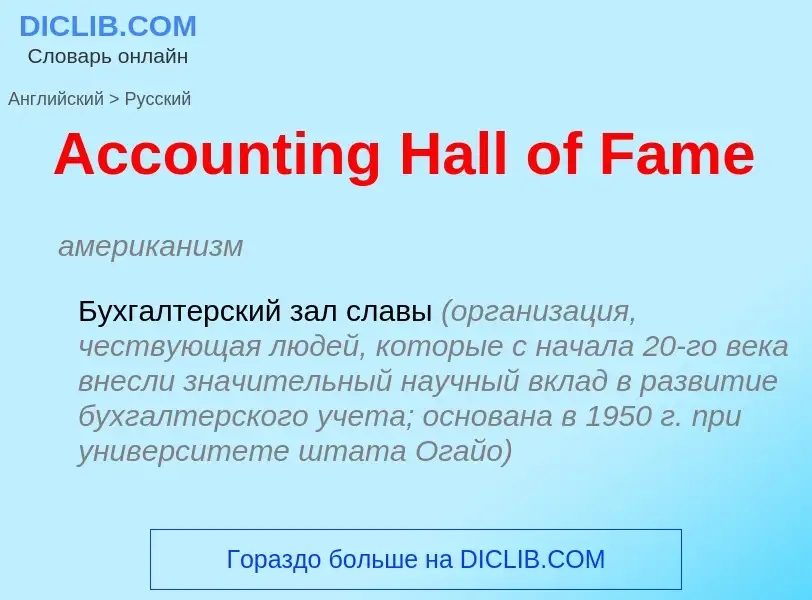Traducción y análisis de palabras por inteligencia artificial ChatGPT
En esta página puede obtener un análisis detallado de una palabra o frase, producido utilizando la mejor tecnología de inteligencia artificial hasta la fecha:
- cómo se usa la palabra
- frecuencia de uso
- se utiliza con más frecuencia en el habla oral o escrita
- opciones de traducción
- ejemplos de uso (varias frases con traducción)
- etimología
visions of power ‹of wealth, of fame› - traducción al ruso
американизм
Бухгалтерский зал славы (организация, чествующая людей, которые с начала 20-го века внесли значительный научный вклад в развитие бухгалтерского учета; основана в 1950 г. при университете штата Огайо)
Definición
.
Wikipedia
"Wealth", more commonly known as "The Gospel of Wealth", is an article written by Andrew Carnegie in June of 1889 that describes the responsibility of philanthropy by the new upper class of self-made rich. The article was published in the North American Review, an opinion magazine for America's establishment. It was later published as "The Gospel of Wealth" in the Pall Mall Gazette.
Carnegie proposed that the best way of dealing with the new phenomenon of wealth inequality was for the wealthy to utilize their surplus means in a responsible and thoughtful manner (similar to the concept of noblesse oblige). This approach was contrasted with traditional bequest (patrimony), where wealth is handed down to heirs, and other forms of bequest e.g. where wealth is willed to the state for public purposes. Benjamin Soskis, a historian of philanthropy, refers to the article as the 'urtext' of modern philanthropy.
Carnegie argued that surplus wealth is put to best use (i.e. produces the greatest net benefit to society) when it is administered carefully by the wealthy. Carnegie also argues against wasteful use of capital in the form of extravagance, irresponsible spending, or self-indulgence, instead promoting the administration of said capital over the course of one's lifetime toward the cause of reducing the stratification between the rich and poor. As a result, the wealthy should administer their riches responsibly and not in a way that encourages "the slothful, the drunken, the unworthy".
At the age of 35, Carnegie decided to limit his personal wealth and donate the surplus to benevolent causes. He was determined to be remembered for his good deeds rather than his wealth. He became a "radical" philanthropist. Prior to publishing his ideas about wealth, he began donating to his favorite causes, starting by donating a public bath to his hometown of Dunfermline. As Carnegie tried to live his life in a way that the poor could benefit from his wealth, he decided he needed to share his ideas with the public.

![[[Carnegie Free Library of Braddock]] in [[Braddock, Pennsylvania]], built in 1888, was the first [[Carnegie Library]] in the United States. [[Carnegie Free Library of Braddock]] in [[Braddock, Pennsylvania]], built in 1888, was the first [[Carnegie Library]] in the United States.](https://commons.wikimedia.org/wiki/Special:FilePath/BCL 1024x768.jpg?width=200)



![[[Edward Gibbon]] praised ''The Wealth of Nations'' [[Edward Gibbon]] praised ''The Wealth of Nations''](https://commons.wikimedia.org/wiki/Special:FilePath/Edward Gibbon by Henry Walton cleaned.jpg?width=200)
![''The Wealth of Nations'' influenced [[Richard Cobden]] ''The Wealth of Nations'' influenced [[Richard Cobden]]](https://commons.wikimedia.org/wiki/Special:FilePath/Hon. Richard Corden, M.P - NARA - 528678.jpg?width=200)
![Bustling with work and activity, "The Wealth of the Nation" by [[Seymour Fogel]] is an interpretation of the theme of Social Security. Bustling with work and activity, "The Wealth of the Nation" by [[Seymour Fogel]] is an interpretation of the theme of Social Security.](https://commons.wikimedia.org/wiki/Special:FilePath/The Wealth of the Nation, Seymour Fogel.jpg?width=200)
![Countries by total wealth (trillions USD), [[Credit Suisse]] Countries by total wealth (trillions USD), [[Credit Suisse]]](https://commons.wikimedia.org/wiki/Special:FilePath/Countries by total wealth (trillions USD), Credit Suisse.png?width=200)



![work=[[Congressional Budget Office]] }}</ref> work=[[Congressional Budget Office]] }}</ref>](https://commons.wikimedia.org/wiki/Special:FilePath/US Wealth Inequality - v2.png?width=200)
, 2018.jpg?width=200)
![PPP]]) PPP]])](https://commons.wikimedia.org/wiki/Special:FilePath/Wdpiechartppp2000.gif?width=200)
![PPP]]) PPP]])](https://commons.wikimedia.org/wiki/Special:FilePath/Worldwealthdistribution2000PPP.gif?width=200)


